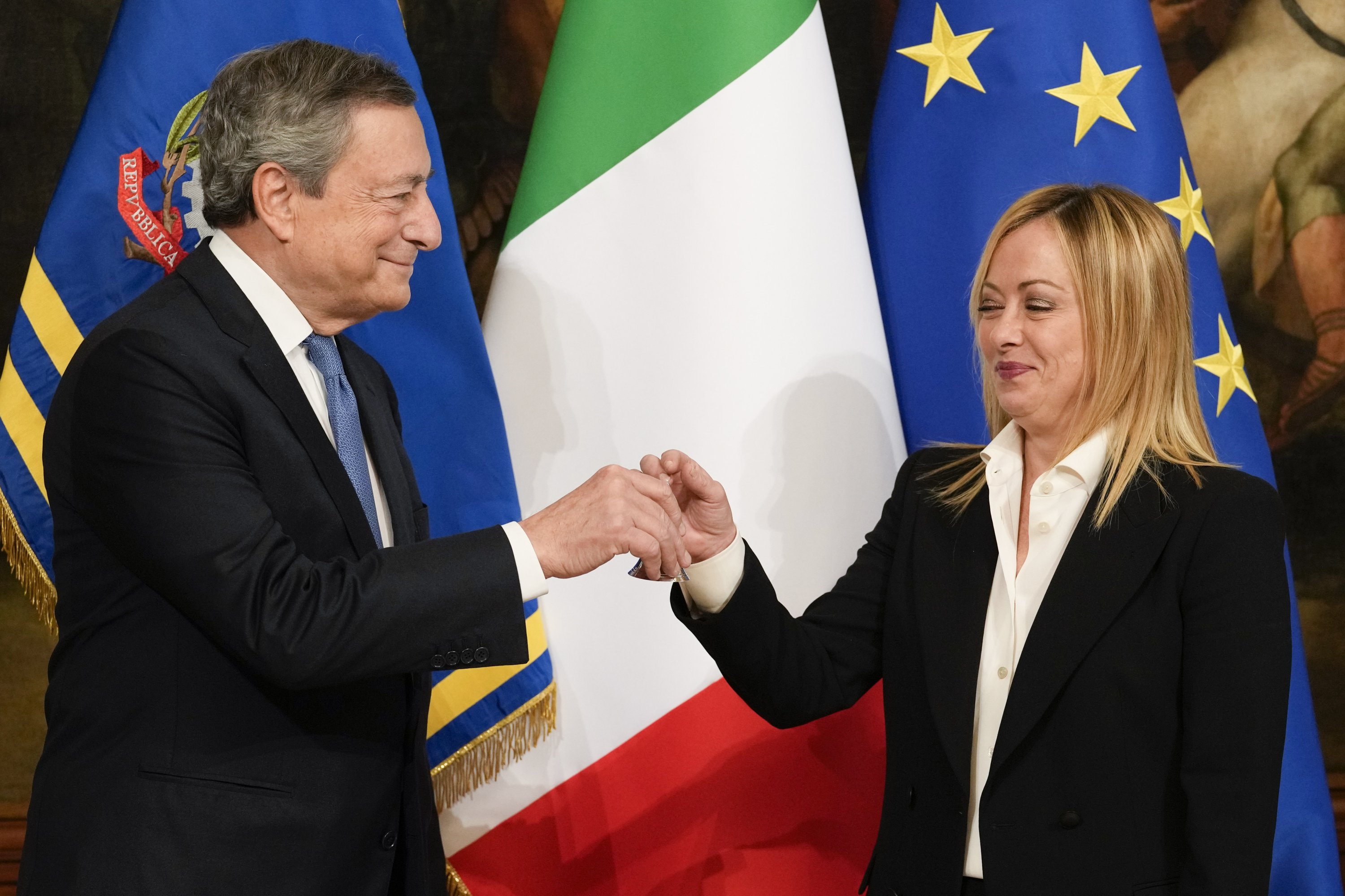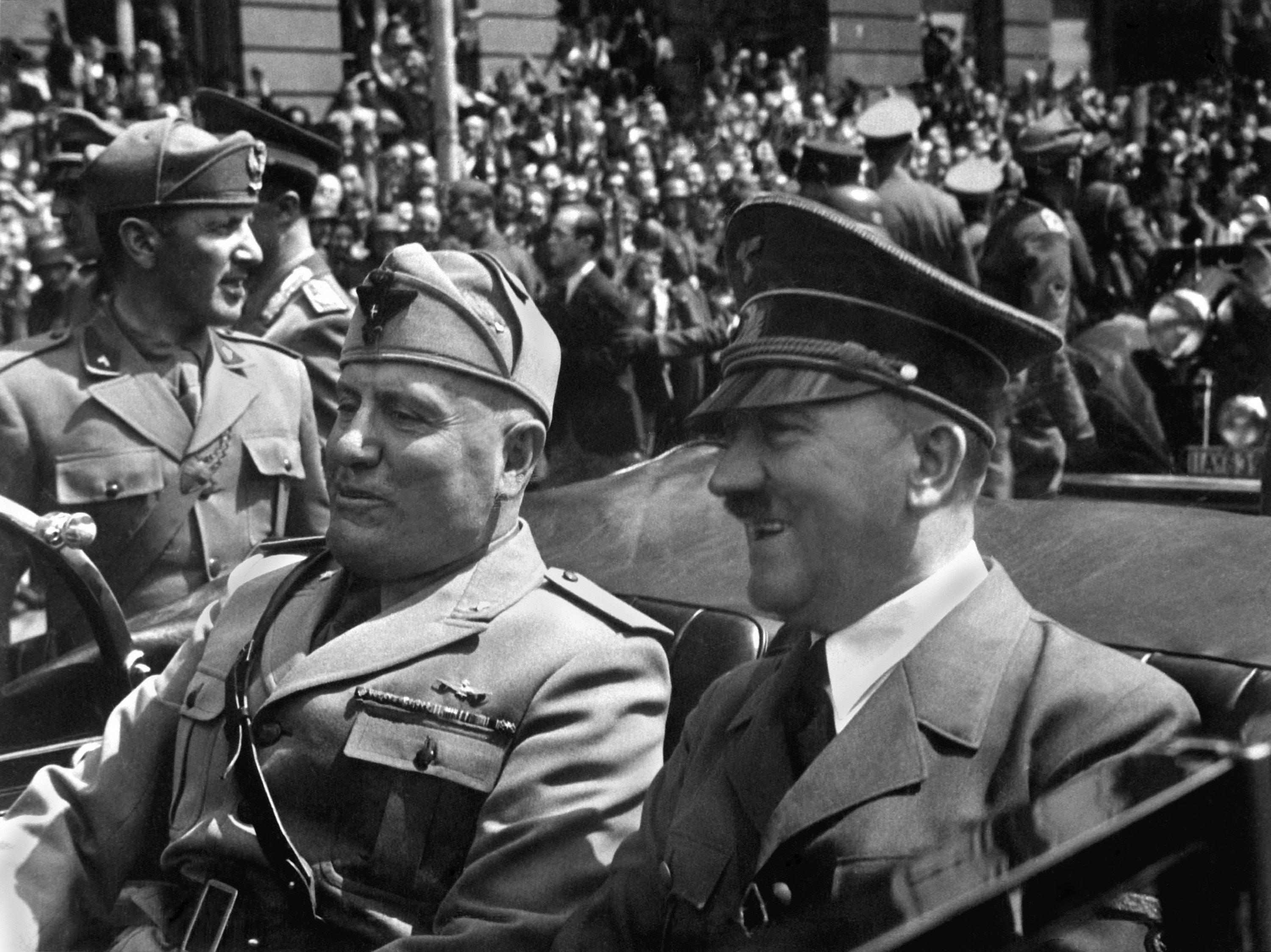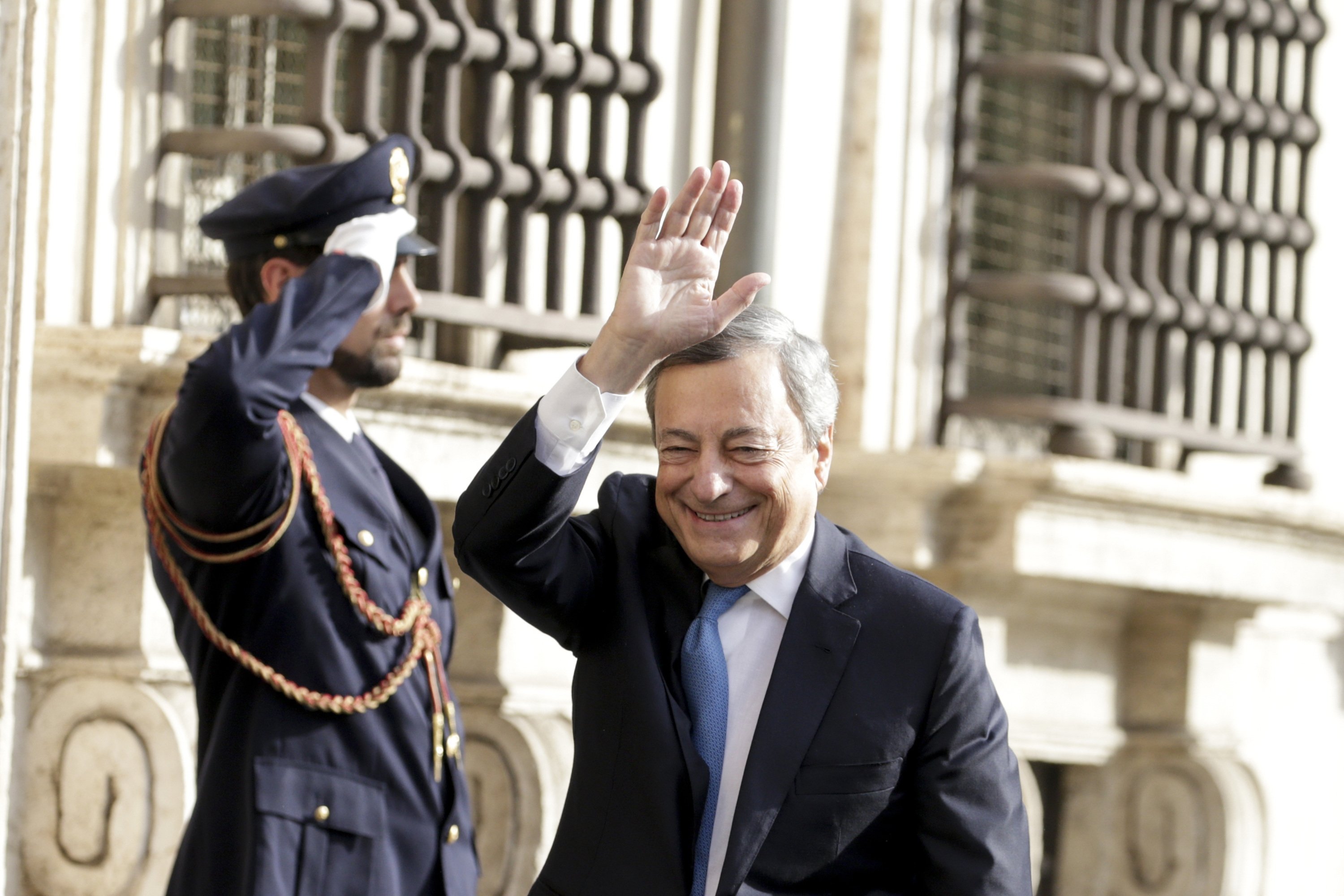© Turkuvaz Haberleşme ve Yayıncılık 2026
"I am Giorgia, I am a woman, I am a mother, I am a Christian.”
Those were the words that brought a very divisive figure under the spotlight, decades after the late dictator Benito Mussolini passed away. Nevertheless, the far-right has never been extinct in Italy – the very place where the Roman Empire once ruled. The lands where the once glorious empire was situated and where the heart of Catholicism beats, is now scene to a very controversial figure: Giorgia Meloni.

In September, Meloni’s far-right and populist “Brothers of Italy” party and her right-wing coalition were swept to victory in the country’s general election with a stunning majority in both chambers of parliament. Recently, the 45-year-old politician took the helm of her country, becoming Italy's first-ever female prime minister.
"I am Giorgia, I am a woman, I am a mother, I am a Christian," was one of Meloni's most well-known catchphrases during her election campaign. The slogan went viral on social media. It was even made into a rap song.
Yes, she is indeed a woman, a mother, a Christian; in addition to being the conservative Italian premier who transcends the glass ceilings... Italians love their new leader. European Union leaders even lined up to congratulate her, as French President Emmanuel Macron and German Chancellor Olaf Scholz have both said they are “ready to work” with Meloni’s new government.
And all those European folks lived happily ever after, or did they?
Although she cast aside her party's fascist roots during the election campaign, Meloni's recent evolution as the front-runner after the election triumph leaves unanswered questions about her future leadership.
Known for her far-right leaning views and her party’s fascist roots despite trying to position herself in the center, Meloni is also notorious for her Eurosceptic, Islamophobic and anti-immigrant rhetoric. She opposes Türkiye's EU membership and still advocates anti-Islamic views, but her stance on the EU has softened a lot lately. Yet, the EU continues to be skeptical of her.
Besides all this, although Meloni denies being a fascist, she clings to the Mussolini-era slogan "God, homeland, family." Furthermore, her party, the Brothers of Italy, keeps using the flame logo associated with fascists and while there are Mussolini sympathizers at the party who are sometimes caught giving the fierce arm salute, some local officials still have memorabilia of Mussolini in their offices.
Time will tell whether her past Eurosceptic stance could make a comeback or the criticisms that she sympathizes with Mussolini and his fascist policies will turn out to be true, but the rise of the far right and Meloni in “the boot of Europe” has already frightened the continent.
Can it be said that Europe’s fears are really unfounded? Is the fear of a new fascism wave unreasonable?
Let’s roll back the tape a little.
World War II was raging across Europe. There were two staunch allies with two dictators at the helm of them: Italy and its fascist leader Mussolini, and his national socialist ally Adolf Hitler who was dreaming of further expanding his Reich.

In an interesting twist of fate, today’s world portrays a similar picture: we have the far-right Alternative für Deutschland (AfD) in Germany and Brothers of Italy; which is ironically led by a woman that has made the headlines with her explosive remarks and remarkable success recently: Meloni.
The German peer of hers, Alice Weidel, is not such a controversial figure that frequently comes under the spotlight as Meloni. Nonetheless, the parallels between both far-right parties seem very similar to the political atmosphere during the times of war, when Mussolini and Hitler had similarly racist motives in their campaign against the forces of the more democratic West.
Meloni’s victory filled far-rightists in other countries of Europe with hope. AfD co-leader Weidel showed her support for Meloni by saying: “Germany stands quite alone in Europe with its ‘traffic light’ coalition.”
AfD Bundestag deputy Beatrix von Storch also tweeted, “Sweden in the north, Italy in the south. Left governments are yesterday.”
France’s National Rally leader Marine Le Pen expressed satisfaction after Meloni’s coalition government was sworn in. “Big day for the European Right!” she said on Twitter, adding that “patriots are coming to power everywhere in Europe and with them this Europe of nations that we wish for.”
The leaders of European countries, where right-wing governments were already ruling, were even more emboldened by the success of their Italian peer. Hungary’s far-right Prime Minister Viktor Orban described Meloni’s victory as a “big day for the European right.”
The current picture, which recalls the painful memories of the past, naturally scares Europe. Not only because of the lessons from past experiences, but also Italy’s position as Europe’s laboratory. The country has foreshadowed the crises of other countries. It had Mussolini before Hitler and the leftwing extremist Red Brigades before France’s Action Directe and Germany’s Red Army Faction. Italy also had Berlusconi before former U.S. President Donald Trump in Washington.
The European media even quickly labeled Meloni as “Mussolini’s successor.” Some newspapers repeatedly said in a hushed voice that Meloni was “not a fascist or even an ultranationalist,” but these faint voices were lost in the cries of European media and harsh political analyzes preoccupied with parsing Meloni to determine if she is a fascist, a neofascist or a post-fascist.
Comments from top EU figures and some Brussels bureaucrats during the election campaign in Italy also demonstrated this fear. There are even those who say that Meloni will be “the new Trump.” European Parliament Vice-President Katarina Barley said Meloni’s victory was “alarming” and that she would take Orban and Trump as role models. And this is not even the most sensational one.
Last month, President of the European Commission Ursula von der Leyen, the German politician who has been serving as the president of the commission since 2019, made an inappropriate comment. She said, “if things go in a difficult direction, I've spoken about Hungary and Poland, we have tools."
Significant is the fact that although she then backpedaled and customarily congratulated Meloni, von der Leyen threatened her, referencing measures that the commission plans to take against Warsaw and Budapest for alleged democratic backsliding. She basically said there would be consequences if Italy steered away from democratic principles.
Undoubtedly, one of the reasons why the EU and European media are so afraid of Meloni is that she is the first popularly elected Italian premier since Silvio Berlusconi was truly elected by the public in 2008. Italian premiers have been chosen over the years through negotiations with EU bureaucrats in the back rooms. Moreover, EU chiefs, including von der Leyen, had appointed anyone they wanted as prime minister of Italy.
Paolo Gentiloni Silveri, who was prime minister of Italy from December 2016 to June 2018, served on the von der Leyen’s commission. His successor, Giuseppe Conte, was plucked out of political obscurity to become prime minister after the Five-Star Movement and League formed a coalition government in 2008. Although both of those parties are, in different ways, Eurosceptic, Conte rejected the suggestion that the government is anti-European.
Bringing the prime minister, who never campaigned for office or ran in Italy’s election, to the lead of a populist coalition that clashes with Brussels over its spending plans is a move befitting EU pragmatism.
I was there when Italy was Europe’s epicenter of the COVID-19 pandemic in 2020. And I witnessed firsthand the country's struggle with the coronavirus and former Prime Minister Conte's centrist coalition government beginning to drift into crisis. Thanks to regular television appearances and press conferences, Conte became a familiar face during “a dark chapter” for the European nation and his popularity skyrocketed. However, he was forced to give way to “Super Mario,” Mario Draghi, former President of the European Central Bank (ECB).

Hence, we can say that rather than her political views, the main motivation behind the EU bureaucrats' stance on Meloni is the possibility that the EU might otherwise miss its chance to rule Italy through its proxies in the government.
This point was also voiced by some European leaders such as Polish President Andrzej Duda. He accused von der Leyen of extreme arrogance over her speeches. "How much of a sense of superiority... arrogance and contempt for democratic rules does one have to have to say of the results of elections in another country, conducted by another nation: 'The wrong one won! They've chosen badly! That country and that government need to be seized by the throat!?'" Duda said on Twitter, referring to her statement.
Meloni, meanwhile, perhaps quite wisely, used her maiden speech to parliament to denounce fascism and to assure allies of Italy’s commitment to the EU. She said that her right-wing coalition did not want “to slow down or sabotage European integration but to steer it to be more efficient in its response to crises ... and to be closer to people and businesses.”
But she warned that Europe should not be “an elite club with first or second division members ... or a company controlled by a board of directors who have to keep the books in order.”
“Those who raise questions are not enemies or heretics but pragmatists who are not afraid to say when something is not working,” she added.
Nevertheless, despite her softening stance toward the EU and voicing that she does not have the slightest admiration for fascism, Meloni does not seem to be liked by the EU bosses. Since she appears to be determined to implement her nationalist program that Brussels would not approve of.
I personally think the fear of a new fascism wave is irrational. Since the situation there today differs greatly from that of the 1920s, when Mussolini took over. Most political groups, the Brothers of Italy among them, approve – at least in principle – the EU. Given today's political spectrum, how accurate would it be to associate the rise of the far right with the revival of fascism?
Meloni is seen by the EU and Brussel's diplomats as the most dangerous Italian political figure not because she explicitly evokes fascism, but because of her ambiguity toward Europe. The EU is very sensitive to the current situation in Italy as if it were an experiment that it fears could spiral out of control at any moment. Since, as I mentioned above, Italy is a sort of laboratory of political experiences. So the rest of Europe will soon follow Italy wherever it goes.
